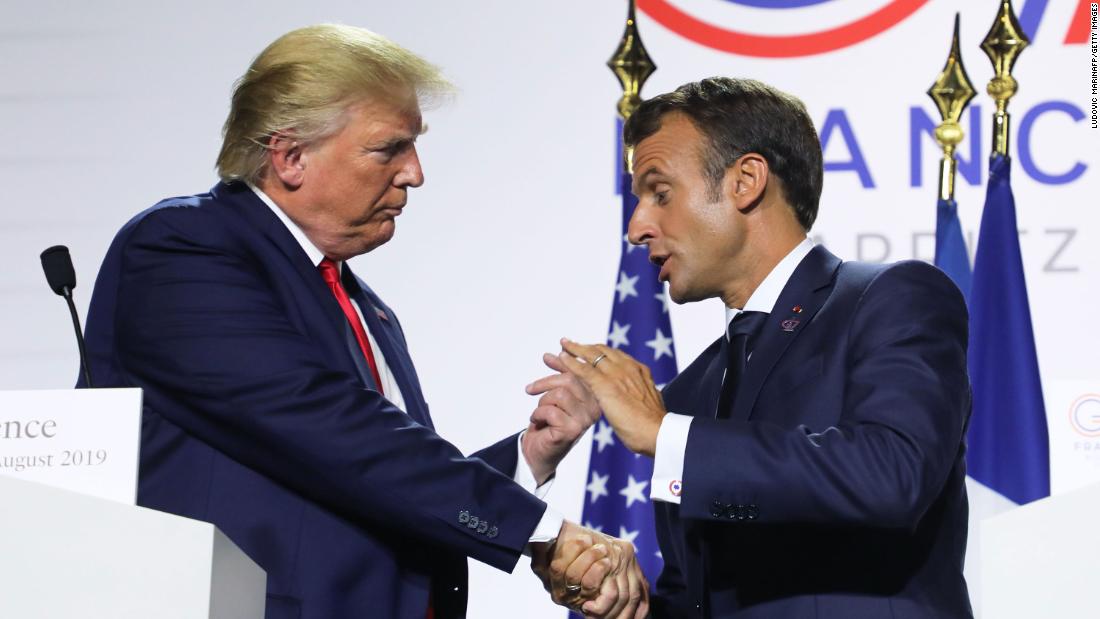
(CNN)Hold on to your bottles of Bordeaux, Burgundy and Pinot Noir.
Despite the supposed agreement, the Trump administration has told the tech industry it is simply holding off on any retaliatory tariffs on France for up to 90 days, according to several people familiar with the matter. Multiple sources said Macron’s announcement dressed up as a done deal what is essentially a pause.
In other words, a trade showdown with France may still be looming.
The trade dispute between the two countries kicked off last month as France moved forward with a new 3% tax on the revenue that large tech companies generate from their digital businesses, such as by collecting vast amounts of user data and selling targeted advertising. In response, the US launched a trade investigation and Trump threatened to tax French wine.
France has argued that large multinational players don’t pay enough taxes in the country even though these companies have significant operations there. Meanwhile, Trump and businesses like Google (GOOGL) and Amazon (AMZN) have said the tax unfairly targets American companies.
But, standing alongside Trump at Monday’s press conference, Macron made it seem as though all was well. Under the terms of the compromise, which Macron touted as “a very good agreement,” France would repay companies the difference between its digital tax plan and whatever comes from a new global tax overhaul being drawn up by the Organization for Economic Cooperation and Development (OECD).
“On this digital tax, we have worked a lot bilaterally and have reached an agreement to overcome these hurdles,” Macron said.
Even at the press conference, there were hints that the matter wasn’t entirely settled. A French reporter noted that US First Lady Melania Trump had been spotted drinking French wine. The reporter then asked the US president whether that meant he had “given up on your threats” of sanctions. Trump skirted the question.
“I can confirm that the First Lady loved your French wine. Okay? All right?” he said. “She loved your French wine. So thank you very much.”
From the administration’s and tech industry’s point of view, the matter is far from settled, the industry sources who spoke to CNN Business said they’ve been told. The US and France have agreed to a 90-day reprieve in order to give the two countries some breathing room to come to an agreement on whether they’re on the same page on the OECD global tax overhaul. But at the end of the 90 days, the US would retain the freedom to retaliate, the industry officials said.
One tech industry official pushed back on descriptions of the compromise as a “deal.”
“What has changed is that the US feels they’ve gotten a new level of commitment from the French in the OECD context in terms of what the objectives are, and what success could look like. And in return for that newfound commitment, [the US] says we’re going to give you 90 days — we will hold off on any kind of further retaliatory measures for a period of 90 days,” the official said.
Regardless, the industry official added that the US Trade Representative’s investigation into the tax would not likely be complete within 90-days, so a retaliatory tariff wouldn’t come in that time period.
Another industry official said the White House had told tech companies that “it’s not a done deal.”
The White House referred CNN Business to the Treasury Department, which declined to comment.
The French Finance Minister’s office referred CNN Business to a press conference that French Finance Minister Bruno Le Maire and OECD Secretary General Angel Gurria held on Thursday, during which Le Maire said France and the US would take lead roles in talks around the OECD tax plan.
Le Maire will meet with US Treasury Secretary Steven Mnuchin next week.
Details on how the French “reimbursement” plan Macron announced would work have also been scarce, despite the fact the first French tax payments are due in November.
The OECD tax overhaul seeks to address shortcomings in global taxation by resolving questions over when taxes ought to be paid and whether those taxes should be collected where the buyers or the sellers are located. While the OECD mechanism is about taxes in general, it is being done with the issue of how to tax digital services specifically in mind.
The plan also seeks to ensure that multinational companies pay a minimum amountof tax, thereby discouraging them from shifting profits to countries with lower levels of taxation, something the tech industry is accused of doing in countries like Ireland with lower corporate tax rates. If a business pays less than the minimum, the country where it operates might be able to demand more tax revenue.
The G20 finance ministers agreed to a roadmap of the new tax plan in May, with the hope of a new agreement being signed by leaders in 2020. Actual implementation would be years away. That’s why some countries, like France and the United Kingdom, are moving forward with their own national taxes.
Read more: https://www.cnn.com/2019/08/30/tech/french-digital-tech-tax/index.html



Recent Comments